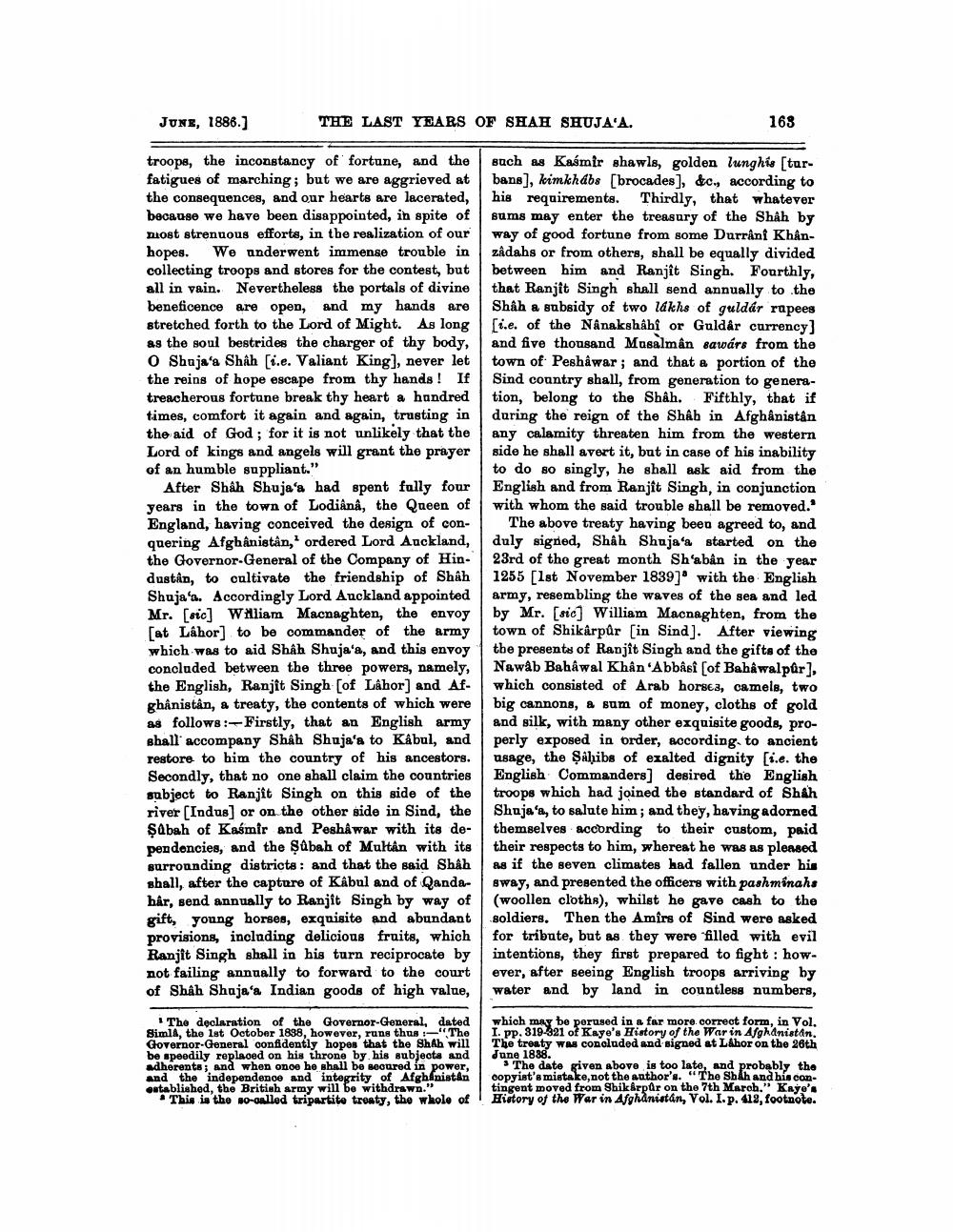________________
THE LAST YEARS OF SHAH SHUJA'A.
JUNE, 1886.]
troops, the inconstancy of fortune, and the fatigues of marching; but we are aggrieved at the consequences, and our hearts are lacerated, because we have been disappointed, in spite of most strenuous efforts, in the realization of our hopes. We underwent immense trouble in collecting troops and stores for the contest, but all in vain. Nevertheless the portals of divine beneficence are open, and my hands are stretched forth to the Lord of Might. As long as the soul bestrides the charger of thy body, O Shuja'a Shah [i.e. Valiant King], never let the reins of hope escape from thy hands! If treacherous fortune break thy heart a hundred times, comfort it again and again, trusting in the aid of God; for it is not unlikely that the Lord of kings and angels will grant the prayer of an humble suppliant."
After Shah Shuja'a had spent fully four years in the town of Lodiânâ, the Queen of England, having conceived the design of conquering Afghanistan,' ordered Lord Auckland, the Governor-General of the Company of Hindustan, to cultivate the friendship of Shah Shujaa. Accordingly Lord Auckland appointed Mr. [sic] William Macnaghten, the envoy [at Lâhor] to be commander of the army which was to aid Shah Shuja'a, and this envoy concluded between the three powers, namely, the English, Ranjit Singh [of Lâhor] and Afghanistan, a treaty, the contents of which were as follows: Firstly, that an English army shall accompany Shah Shuja'a to Kâbul, and restore to him the country of his ancestors. Secondly, that no one shall claim the countries subject to Ranjit Singh on this side of the river [Indus] or on the other side in Sind, the Sabah of Kasmir and Peshawar with its dependencies, and the Subah of Multan with its surrounding districts: and that the said Shah shall, after the capture of Kâbul and of Qandahår, send annually to Ranjit Singh by way of gift, young horses, exquisite and abundant provisions, including delicious fruits, which Ranjit Singh shall in his turn reciprocate by not failing annually to forward to the court of Shah Shuja'a Indian goods of high value,
The declaration of the Governor-General, dated Simla, the 1st October 1888, however, runs thus :-"The Governor-General confidently hopes that the Shah will be speedily replaced on his throne by his subjects and adherents; and when once he shall be secured in power, and the independence and integrity of Afghanistan established, the British army will be withdrawn."
This is the so-called tripartite treaty, the whole of
163
such as Kasmir shawls, golden lunghie [turbans], kimkhábs [brocades], &c., according to his requirements. Thirdly, that whatever sums may enter the treasury of the Shah by way of good fortune from some Durrânî Khânzâdahs or from others, shall be equally divided between him and Ranjit Singh. Fourthly, that Ranjit Singh shall send annually to the Shâh a subsidy of two lakhs of guldár rapees [i.e. of the Nânakshâhî or Guldår currency] and five thousand Musalman sawárs from the town of Peshawar; and that a portion of the Sind country shall, from generation to generation, belong to the Shah. Fifthly, that if during the reign of the Shâh in Afghanistân any calamity threaten him from the western side he shall avert it, but in case of his inability to do so singly, he shall ask aid from the English and from Ranjit Singh, in conjunction with whom the said trouble shall be removed."
The above treaty having been agreed to, and duly signed, Shâh Shuja'a started on the 23rd of the great month Sh'abân in the year 1255 [1st November 1839] with the English army, resembling the waves of the sea and led by Mr. [sic] William Macnaghten, from the town of Shikarpûr [in Sind]. After viewing the presents of Ranjit Singh and the gifts of the Nawab Bahawal Khân 'Abbâsî [of Bahawalpûr], which consisted of Arab horsea, camels, two big cannons, a sum of money, cloths of gold and silk, with many other exquisite goods, properly exposed in order, according to ancient usage, the Sahibs of exalted dignity [i.e. the English Commanders] desired the English troops which had joined the standard of Shah Shujaa, to salute him; and they, having adorned themselves according to their custom, paid their respects to him, whereat he was as pleased as if the seven climates had fallen under his sway, and presented the officers with pashminahs (woollen cloths), whilst he gave cash to the soldiers. Then the Amirs of Sind were asked for tribute, but as they were filled with evil intentions, they first prepared to fight : however, after seeing English troops arriving by water and by land in countless numbers,
which may be perused in a far more correct form, in Vol. I. pp. 319-321 of Kaye's History of the War in Afghanistan. The treaty was concluded and signed at Lahor on the 26th June 1888.
3 The date given above is too late, and probably the copyist's mistake, not the author's. "The Shah and his contingent moved from Shikarpur on the 7th March." Kaye's History of the War in Afghanistan, Vol. I. p. 412, footnote.




